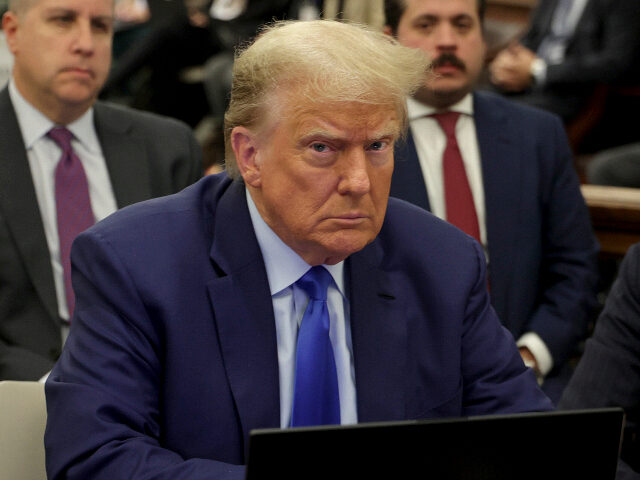WASHINGTON, DC — Donald Trump appeared in a federal courthouse on Tuesday for oral arguments regarding his potential presidential immunity from prosecution by Special Counsel Jack Smith.
In spirited arguments lasting more than an hour, the three-judge panel in the U.S. Court of Appeals for the District of Columbia Circuit pressed Trump’s counsel, John Sauer, on his claims that Trump is immune from prosecution because his actions fell within his official duties as president.
To “authorize the prosecution of a president for his official acts would open a Pandora’s Box from which this nation may never recover,” Sauer told the court.
The panel consisted of Judges Karen Henderson, a late President George H. W. Bush appointee, and Michelle Childs and Florence Pan, whom President Joe Biden appointed. Polls project Biden will face Trump in November.
For much of the hearing, the judges peppered Sauer with hypothetical situations — including ordering Seal Team 6 to assassinate a political rival — for which a president could or could not be criminally charged. Sauer referenced the Impeachment Judgment Clause of the Constitution, arguing that the Constitution dictates that the president first must be impeached and convicted by Congress.
Sauer said that even if a president is immune, the Constitution protects a president from being charged for an alleged crime for which the Senate acquitted him.
The judges did not appear receptive to those arguments.
Prosecutor Jack Pearce, with Smith and Trump looking on, argued that Trump’s presidential immunity claims would place him above the law:
The president has a unique constitutional role, but he is not above the law. Separation of powers principles, constitutional text, history, precedent, and immunity doctrines all point to the conclusion that a former president enjoys no immunity from prosecution.
Sauer pushed back, arguing that presidential criminal immunity does not place the president above the law, which he called “more rhetoric than reality,” but is a critical component of the law for good reason.
“The Supreme Court… describe[s] the allegation that immunity sets the official above the law as ‘rhetorically chilling, but wholly unjustified.'” He continued, “The U.S. Constitution, the separation of powers, the Executive Vesting Clause, the Impeachment Judgment Clause, these are the foundational and fundamental law of our country.”
Sauer additionally referenced the Federalist Papers and Chief Justice John Marshall’s opinion in Marbury v. Madison in support of the argument that the president is immune from suit.
One judge briefly raised the question of the legality of Smith’s appointment. In December, an amicus brief filed by attorneys for former Attorney General Ed Meese argued that Smith’s appointment as special counsel by U.S. Attorney General Merrick Garland is unconstitutional, so the court must reject his prosecution against Trump.
But Sauer chose not to pursue the Appointments Clause issue in arguments.
Childs and Pan, referencing an argument in an amicus brief filed by American Oversight, indicated they might rule they lack jurisdiction to consider the question of immunity, which would force the trial in the lower court to proceed. In that scenario, Trump would not be able to raise the question of immunity until after a jury trial and potential conviction.
However, the Supreme Court would likely consider that question.
Given the expedited schedule, a ruling is possible within the next several weeks before the trial is set to begin on March 4. However, the U.S. Supreme Court is likely to take up the immunity issue.
The case is United States v. Trump, No. 23-3228, in the U.S. Court of Appeals for the District of Columbia Circuit.
Bradley Jaye is a Capitol Hill Correspondent for Breitbart News. Follow him on X/Twitter at @BradleyAJaye.

COMMENTS
Please let us know if you're having issues with commenting.